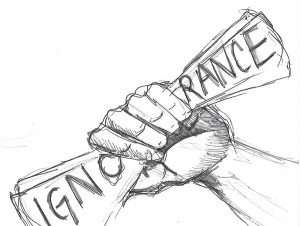COUNTERPOINT: General education should reflect pluralistic society
 Last semester saw significant changes to the university general education curriculum — most notably, its removal of the diversity requirement. Whereas students who began college before Fall 2015 were responsible for satisfying six general education categories, including a course focused on diversity, new core standards eliminated the diversity requirement and replaced it with two additional categories entitled “Citizenship in the Global Era” and “Traditions and Historical Foundations.”
Last semester saw significant changes to the university general education curriculum — most notably, its removal of the diversity requirement. Whereas students who began college before Fall 2015 were responsible for satisfying six general education categories, including a course focused on diversity, new core standards eliminated the diversity requirement and replaced it with two additional categories entitled “Citizenship in the Global Era” and “Traditions and Historical Foundations.”
Some have lauded the change as a positive step in improving the general education system, but the removal of the diversity requirement threatens to have serious repercussions for the university’s academic culture.
In a diversity forum hosted by the Department of American Studies and Ethnicity in January, students, professors and administrators discussed the impact these new general education requirements would have on students’ curriculum and the campus community going forward. Though some panelists explained that the diversity requirement was not exactly removed but merely expanded in scope, ASE Associate Professor Shana Redmond raised the important point that without the intentional usage of the word “diversity,” its distinctive academic importance risked being lost within the rest of the general education curriculum.
Though there is nothing wrong with providing a wider global scope to every student’s undergraduate education, diluting the diversity requirement within the broader label of “global perspectives” fails to highlight the importance of having the requirement in the first place. The diversity requirement was implemented for the very purpose of providing students with the knowledge and analytical skills necessary to understand and respect diversity. In a university that boasts of so many different fields of academic study, such a goal is difficult to achieve without instituting some sort of requirement that is geared toward all students, regardless of their college or their area of study.
While it is certainly true that diversity should be as deeply embedded in all aspects of academic life as possible, instituting a diversity requirement is the only way to ensure that all students study issues related to racial, ethnic, gender, socioeconomic, sexual orientation or religious diversity in ways that may not have necessarily been offered to them otherwise. By mandating that students enroll in at least one course geared toward these types of diversity that exist both on campus and in society at large, the University can ensure that this important part of every student’s liberal arts education is satisfied.
Last semester’s campus-wide conversations surrounding the Undergraduate Student Government’s Campus Climate Resolution is a testament to the fact that students care about instilling a university culture that respects and promotes diversity. But these conversations shouldn’t be left to weekly senate meetings and campus forums. If the University hopes to prepare students for responsible and thoughtful citizenship in our increasingly pluralistic and diverse world, then it must do more to ensure that diversity remains a fundamental cornerstone of a USC education.
Reimplementing the diversity requirement for all undergraduates is the best and most efficient way to do that.
Yasmeen Serhan is a senior majoring in international relations. “Point/Counterpoint” runs Tuesdays.
